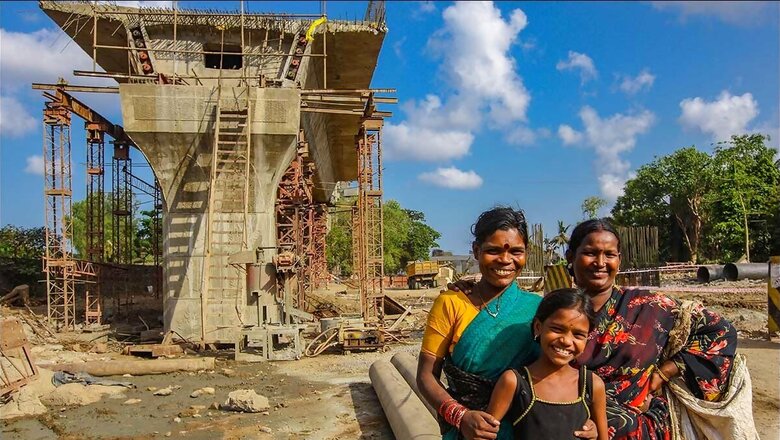
views
Most of us are unaware of our privilege – that, unfortunately, is how privilege works. If you’re a gender conforming man or woman, you’ve never had to struggle with your gender identity. If your education wasn’t interrupted, you have prospects today. If your family didn’t struggle with poverty and hunger, your baseline wealth and your education almost ensures that you won’t either. If you’re a man, well, then you aren’t afraid of being attacked when you go to the toilet, take a bus/train late at night, or worry that your career or education will be interrupted by marriage, in-laws or childbirth.
Women, particularly those who hail from low income households face challenges that are very particular to them, and alien to the rest of us. Seen as mothers and wives to be, their education is deprioritised in favour of their brothers’. They are often married off at an early age, because then they become someone else’s ‘burden’. In their new families, their needs are often placed at the bottom of the list, and their freedoms curtailed. They are encouraged to have children, many children, irrespective of their own health, or ability to care for these children. They are expected to run the household on meagre income, and often blamed when they can’t. They are discouraged from working outside the home, irrespective of their poverty.
For the few women who step outside the home, the opportunities are few and far between. Their lack of education and experience means that only menial work is open to them, and there too, they compete with men, who are often paid more for the same work. This desperation translates into a situation where these women can often be exploited. In the unorganised sector, there are no labour laws, no ombudsman to complain to, no fixed salaries, women sanitation workers often bear the worst of this system.
The Daunting Challenges Faced by Women Sanitation Workers
Women sanitation workers, to whom we owe our health, often work in dehumanising and hazardous conditions. The work they do is hazardous in itself because they are cleaning wastes, but the risks are often compounded because of their working conditions. They work without even the basic protections like masks and gloves, exposing them to several respiratory and skin infections.
Women sanitation workers also face a trifecta of discrimination: one, because they often hail from backward classes, castes and communities where sanitation work is considered the community’s ‘traditional’ occupation. Two, because they are sanitation workers. Three, because they are women.
Moreover, in the unorganised sector, these women often struggle to get paid. There are so many stories of women who clean toilets for as little as ₹25, and after a whole month of doing their job, are stiffed for their pay. They have no one to complain to, and no one to stand with them in this fight. They are poor, uneducated women with no power against their employers. They are replaceable, and replacements are easy to come by.
Ordinary Heroes, Extraordinary Stories
In the face of these formidable challenges, the stories we’re about to tell you will sound incredible, and they are. These women have plumbed the depths of their courage and determination, and in the face of incredible odds, created a life for themselves that stands as a testament to what is possible when you have grit, and the right support at the right time.
Maya Sable: A Beacon of Empowerment
Maya Sable worked as a sanitation worker in the unorganised sector, earning a meagre ₹5000 a month, in which she needed to manage rent, groceries and her children’s education. She was the sole breadwinner. The turning point for Maya was when she had to interrupt her daughter’s schooling because she could no longer afford it.
Fortunately, Maya heard about the Harpic World Toilet College (HWTC), and enrolled in their training program to become a certified sanitation professional. On completing her training, Maya was placed at a Clean and Care Facilities Service in Housekeeping, where she is earning double her salary, has access to PPE kits, and even has a Provident Fund, ESI and Insurance. She works a respectable 8 hours a day, and between her steady employment, better income and the cover that insurance provides, she is even able to save a little for a rainy day.
Today, Maya advocates safe sanitation, and has steered many of her erstwhile peers to HWTC for training.
Vandana U. Gaikwad: From Cleaner to Counselor
Like Maya, Vandana started her career as a toilet cleaner at a local police station. As a child, she had been an excellent student, but had to drop out of school due to her family’s finances.
When she enrolled in HWTC’s programs, she learnt much more than just the core aspects of her job. The training instilled a newfound confidence in her. Today, Vandana plays a pivotal role at the police station, not just as a sanitation worker but also as a counsellor for family violence-related cases. Her work is inspiring. So much so that her brother went on to complete his Masters in Social Work, and now works as a mobiliser for HWTC.
The Role of Harpic World Toilet College
A common thread running through these stories of transformation is the pivotal role played by Harpic World Toilet College. As India’s leading brand in the lavatory care segment, Harpic has a deep and nuanced understanding of the challenges that women sanitation workers face. It channelled this understanding into the creation of Harpic World Toilet College in 2016.
HWTC was established with the stated objective of improving the quality of life of sanitation workers through their rehabilitation by linking them with dignified livelihood options. Workers trained by the college are provided placement with various organisations. Following the successful proof of concept in Rishikesh, HWTCs have opened in Maharashtra, Aurangabad, in partnership with Harpic, Jagran Pehel and Maharashtra Government.
For Harpic, these stories and many others like them powered their quest to make this a larger conversation on the national scale. To that end, Harpic joined hands with News18 in Mission Swachhta aur Paani, a movement that champions the cause of inclusive sanitation, equality for all genders, abilities, castes and classes and the strong belief that clean toilets are a shared responsibility.
For 3 years now, Mission Swachhta aur Paani has brought together the right stakeholders on a common platform, so that issues of importance can be discussed, and solutions found.
Join us here, so you too can be a part of the solution.




















Comments
0 comment